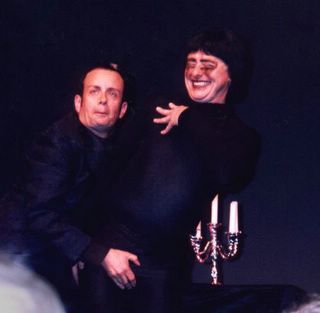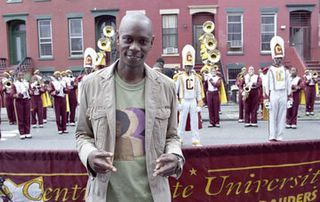If This Votes A-Rockin', Don't Bother Knockin'
If you've noticed a downturn in the number of political posts on Crushed by Inertia, you really should get a life beyond reading this blog. But nonetheless, you'd be more or less accurate. I find that I have fewer and fewer sarcastic things to say about the news as it gets increasingly dire and hallucinatory. I know that our political system has always, at least during my lifetime, been teetering on the cusp of total insanity. But I think some time during the last 3.5 years, we went completely over the cliff, shattering every last bone in our bodies on the rocky crags of Lovecraftian horror-madness below.
It started slowly. Weird fringe beliefs - apocalyptic fantasies, long-simmering regional prejudices, eliminationism - were suddenly finding their way into major newspapers and cable TV shows. There was a time, 9 years ago, when Ann Coulter was fired from MSNBC for slandering veterans:
Kurtz also told Extra! that MSNBC had confirmed that Coulter was let go after making such a comment to a disabled Vietnam veteran.
In the MSNBC NewsChat segment, in which Coulter debated Bobby Muller, president of the Vietnam Veterans of America Foundation, her exact words to the paralyzed veteran were: "No wonder you guys lost."
She was interrupting Muller's point about the role that landmines played in the Vietnam War: "In 90 percent of cases that U.S. soldiers got blown up--Ann, are you listening?--they were our own mines."
Today, she says far more offensive things than that, specifically denying the heroic veteran status of guys like John Murtha and Max Cleland and John Kerry, as well as, disgustingly, denying the authenticity of the grief of 9/11 widows.
And not only does she appear on MSNBC, she's Jay Leno's invited guest on The Tonight Show! On regular ol' NBC. Why on Earth would NBC want to have Coulter on a nightly entertainment show? She's about as entertaining as...well, as Jay Leno. I guess they've got me there.
(I, for one, was disappointed that Coulter's fellow guest, George Carlin, didn't say anything to her about her hateful brand of rhetoric. She's exactly the kind of brain-dead sycophantic TV talking head that Carlin attacks frequently in his stand-up. I think the George Carlin of 20 years ago would have said something...But I guess he felt it wasn't an appropriate venue. Maybe she'll come on his next HBO special.)
You see my point. The whole nature of public debate in America has changed. The tenor of the entire thing. When I did team debate in high school, the issues taken up were controversial "public issues of the day." And it was always important stuff - immigration, universal health care, China's Favored Nation Status. But we never debated the sort of issues that come up today. It seemed like, certain things were just understood, certain bedrock American principles respected, and then lets argue about the smaller things about which the Constitution is not fully clear. Like abortion and euthanasia and welfare.
There are some Bush II-era disturbances that have seemingly upset this delicate balance on a more permanent level. That just denigrate our national conversation, remove a lot of the dignity this country has managed to somehow preserve after decades of inept, vicious and greedy foreign policy. Here's a short list:
(1) The "unitary executive" theory: I can't think of a larger threat to American democracy than the President claiming to be above the law and the seat of all governmental power. The President can't create the law single-handedly and can't operate above the law. I shouldn't have to tell anyone that this was the entire point of the country in the first place. It's almost as if no one remembers their Montesquieu!
But it's not only that Bush as King violates everything American about America. It's that he's using this power to undermine the very fabric of our society, and no one seems able to stop him even though the people kind of know what's going on by now.
How, you may ask, is he undermining the very fabric of our society? Well, let me just skip ahead to:
(2) Torture: See, this shouldn't even be on the table. We've kind of agreed, all of us civilized people, that torture is bad. In fact, however hypocritically, the United States has historically spoken out against torture on an international level. We kind of scold other countries, like China and Russia, who still brutalize their own citizenry. The fact that we're now openly torturing people, and a lot of Americans are speaking up in favor of the practice (or at least willingly turning a blind eye), means we've already lost this war. I don't care how many "al-Qaida leaders" you guys want to blow up, the fact that the whole world's seen us dragging around terrified bloody Muslim guys means we lose. We're officially worse than the 9/11 hijackers to the rest of the world. That was one day five years ago. We've been doing this horrible shit ever since.
I think torture's one of those things that makes good people turn away from being politically aware altogether. If our government can just decide to start torturing people, and there's nothing we can do, why bother voting or seeking out real news and information? Doesn't actively participating in the political process make you complicit in some way in these crimes?
But torture isn't the thing that keeps most people away from the polls. I know, that's still laziness and a generally disaffected attitude. Also, this next item:
(3) Rigged elections: If you can't convince people that their vote will be counted fairly, they won't bother to vote. I mean, this makes me want to give up, too. From Skippy the Bush Kangaroo:
the brad blog keeps digging up more and more people who are questioning the results of california 50 race, where francine busby lost by a mere 4000 votes to bilbray. the fact that most of the diebold election machines were taken home and stored in cars and garages overnight before the election might have something to do with people's questions.
Did you just read that? The voting machines were stored in individual's cars and garages? Can you fucking imagine?
I work in a store. I've never once taken the safe home with me for the night, for storage purposes. Do any of you who work with sensitive materials during the day bring them with you at night in your freakin' car? Any engineers taking your work home with you? Hey, it's only top-secret plans for a new radar system. What could go wrong? Just throw it anywhere, I'll deal with it tomorrow!
As Bill Paxton would say, "Game over, man! Game over!" One the elections are just assumed to be fraudulent, you've got yourself a despotic regime, my friend. Have fun with that. If anyone wants me, I'll be sneaking across the Mexican border, to a nation where at least the drug laws make sense.










